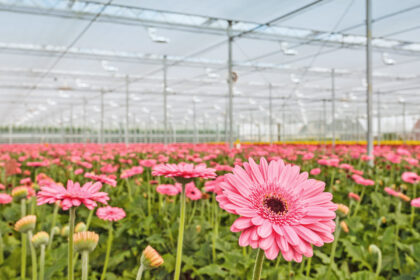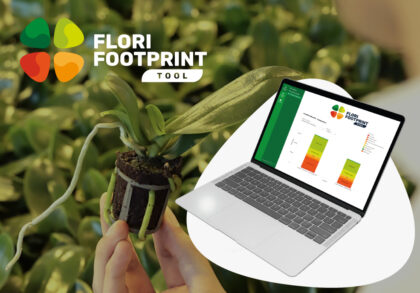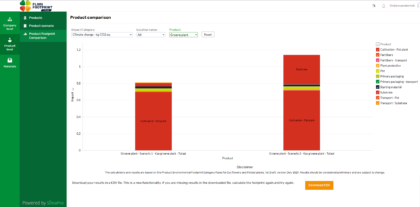Flori Footprint Tool – LCAs of floriculture, accessible at your fingertips



Greenhouse Sustainability
Growers, traders and retailers of floriculture products are embracing life cycle assessment (LCA) to help the sector move to climate neutrality. With the Flori Footprint Tool, they now have the capability to quickly and easily conduct comprehensive LCAs on their whole product range, allowing them to make clear improvements.
About
Greenhouse Sustainability is a consultancy firm that focuses on environmental footprint calculation, reduction, offsetting and storytelling in the two sectors of floriculture (the cultivation of ornamental plants and flowers) and horticulture (the cultivation of fruits and vegetables). They calculate footprints through LCA and offer advice for reduction and offsetting. With storytelling, they further contribute to positive impact on and by companies.
Challenge
Growers, traders, and retailers of floriculture products in Europe have to be climate neutral in 2050, as stated in the European Green Deal by the European Commission. To achieve this, they created a working group that reached out to Greenhouse Sustainability with the request for a tool that could give insights into the environmental impacts of the floriculture products they produce and sell. Doing traditional LCAs is a long and costly process and often produces a one-off result. Growers, traders, and retailers of floriculture products need a simple, comprehensive, and fast tool. In addition, they need repeated results, gradually extending to their entire product portfolio.
Solution
Greenhouse Sustainability partnered with PRé to design and build this tool together: the Flori Footprint tool, powered by SimaPro. Greenhouse Sustainability has close contacts with companies in the floriculture sector and knowledge of LCA modeling for this sector. PRé provided the SimaPro calculation engine and expertise in its use. The resulting tool enables growers of flowers and plants to calculate their environmental footprint on the company and product level using a mix of their own data and background data.
Once a user has purchased a license and set up their account, they can immediately start calculating their footprint. For each product scenario, the user fills in a variety of data, such as the starting materials and substrate used, cultivation time, and product dimensions. This primary data will be supplemented with secondary data from databases that is generally hard to come by for a user, such as the impact of electricity in a particular country.

Once all information is submitted, the footprint will be calculated using an LCA model built for this tool in SimaPro. This model represents the supply chain for floriculture products: the raw materials (starting material, substrate, fertilizer, plant protection, etc.), the cultivation of the product (use of energy, water, fuel, the greenhouse itself, etc.), all distribution and packaging used in the entire chain, storing, auctioning, sales, use of the product by the customer and finally the end-of-life where the product is discarded.
The LCA model follows the PEFCR for floriculture products, giving the results reliability, comparability and scientific backing. The impact results are then sent back to the Flori Footprint Tool and can be accessed by the user within seconds of pressing the calculate button.
The scenario results include up to sixteen different impact categories, such as carbon footprint, ozone depletion, land use, water use, and terrestrial eutrophication. This last category is especially relevant for the sector. It describes an excess of nutrients in the soil – usually from fertilizers – that causes overgrowth of plants. Each impact category result is divided into different components, so the user can see where the impact for that impact category is coming from. For instance: fertilizers, substrate, or transport. The user can also copy the scenario, make iterations, and investigate what kind of effect certain changes in the process will have on the total impact. Results can be easily exported and shared within the organization.

An example of the Flori Footprint Tool results page
Benefits
Users of the Flori Footprint Tool can do LCAs without any effort from external consultants. This speeds up the process and reduces costs for the user. The main benefits of this solution:
- It’s a comprehensive tool including all stages of floriculture, even though users only need to provide necessary inputs. Users can also provide more detailed data if available. Due to this layered presentation of inputs, the tool is easy to understand and fast to fill in. No LCA expert is required.
- Scenarios can be copied and altered, making the tool suitable for analyzing the entire product portfolio. Because the tool follows the PEFCR, it allows for comparing LCAs of a wide range of products.
We plan to further develop the tool in the coming months. Future versions of the tool will allow for bulk import of data to scale up calculations for a grower’s entire portfolio of products. They will also focus more on traders and retailers in the floriculture sector. A great benefit of the Flori Footprint Tool, in addition to the tool being simple to use, comprehensive, and fast, is that it gives direct insight into scope 3 emissions (indirect emissions that occur in the upstream or downstream activities of a company, such as impact from growers).